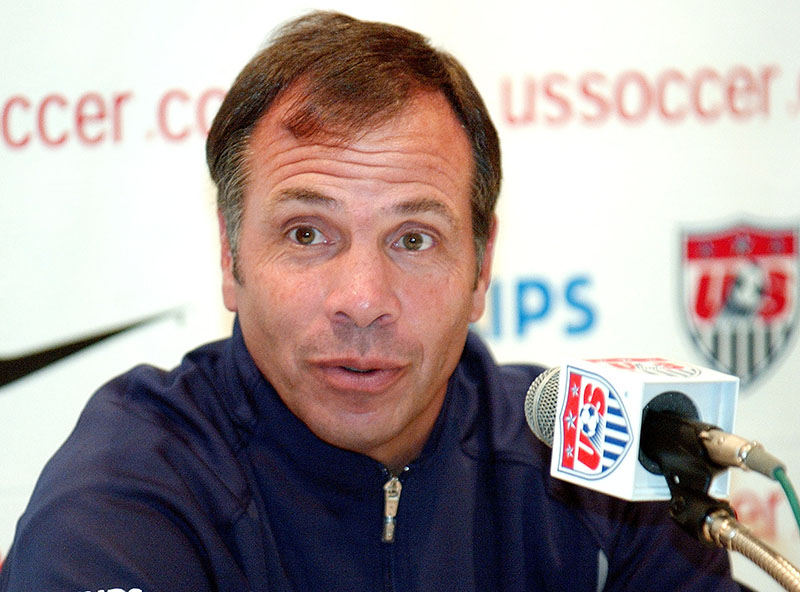Bruce Arena returns as US coach, replacing Jurgen Klinsmann
NEW YORK: Bruce Arena was a decade removed from the US national team when he received a telephone call from US Soccer Federation Secretary General Dan Flynn on Sunday asking him to meet with USSF President Sunil Gulati the following day.
By midday Tuesday, the winningest coach in the team's history regained the job he had not wanted to give up.
"I never expected to be back in this role the way it came about over the last 48 hours," Arena explained. "I hate to say this now to Sunil: I would've done this for free."
A day after Jurgen Klinsmann was fired following two losses that began the final round of World Cup qualifying, Arena agreed to a contract running through the 2018 tournament in Russia.
With the Americans 0-2 at this stage for the first time, the USSF wants to spark a turnaround when competition resumes March 24 with a home game against Honduras followed four days later with a match at Panama. The 65-year-old Arena, inducted into the US National Soccer Hall of Fame in 2010, starts work Dec. 1.
"We need to build the chemistry of this team and have a common goal and really work on a team concept," he said during a telephone news conference. "I really believe individually and positionally we have good players and we've just got to get them working together as a team.
"There are no real secrets on how you build good teams: It takes a lot of hard work, it takes communication, it takes discipline and it takes some talent, and I think we have enough talent to build a good team and end up in Russia 2018. It's going to take a little time, a little bit patience and a lot of hard work."
Arena first took over as national team coach after the 1998 World Cup and led the US to a 71-30-29 record. Gulati fired him, failed to reach a deal with Klinsmann and then brought in Bob Bradley.
"I don't view it as Bruce 2, but sort of Bruce 2.0," Gulati said. "I think he's got far more experience than he did when he had the national team the first go-round. He's proven and re-proven many times at all levels of the game in the United States that he's an extraordinarily capable and successful coach."
A wisecracking Brooklynite known for blunt talk and sarcasm, Arena coached the University of Virginia to five NCAA titles from 1978-95, then led D.C. United to championships in Major League Soccer's first two seasons before losing in the 1998 final. He guided the Americans to the team's best World Cup finish since 1930, a 1-0 loss to Germany in the 2002 quarterfinals.
Arena was let go after the team's first-round elimination by Ghana in 2006. He coached MLS's New York Red Bulls from July 2006 to November 2007, then was hired the following August by the Galaxy. He led that team to MLS titles in 2011, 2012 and 2014.
"I think 10 years later I'm better prepared for this job than I was in 1998 and 2002 and ultimately 2006, so I'm hopeful the experiences I had are going to benefit the program," he said. "One of the things you learn from experience is you see things a lot clearer and a lot quicker than you did previously, and the game has slowed down a bit, where I can see as a coach in my position how things are happening on the field."
Hired by Gulati in 2011, Klinsmann coached the US to the 2013 CONCACAF Gold Cup title and the second round of the 2014 World Cup, where the Americans lost to Belgium 2-1 in extra time.
Gulati cited three disappointments that led to Klinsmann's firing: not qualifying for the 2017 Confederations Cup, the under-23 team's failure to reach this year's Olympics and the poor start to the final round of qualifying in the North and Central American and Caribbean region.
The US would have reached the Confederations Cup by winning last year's Gold Cup, but Jamaica upset the Americans in the semifinals, and the US lost a playoff to Mexico.
"Really starting at the Gold Cup, we've had some very up-and-down results," Gulati said. "The Gold Cup was a big disappointment for everyone: for Jurgen, for the players, for our fans."
Two weeks ago, Gulati said he expected Klinsmann to keep his job through the 2018 World Cup. But Mexico won 2-1 in Columbus, Ohio, the first US home loss in qualifying since 2001. That was followed by a 4-0 defeat last week in Costa Rica, the Americans' first four-goal loss in qualifying since 1980.
"None of us expected the two results we got," Gulati said.
He held a series of conversations with USSF board members after last Tuesday's defeat, made the decision Sunday and joined Flynn for a Monday meeting in Los Angeles with Klinsmann.
While Gulati returned to New York, Flynn remained in Los Angeles to negotiate Arena's contract, which was agreed to at 11:30 a.m. EST Tuesday and approved by the board 15 minutes later. Arena's return was announced at 1:21 p.m.
A star forward for Germany in the 1990s, Klinsmann was criticised by some — including Arena — for his use of foreign-born players. Five German-Americans were on his 23-man World Cup roster.
"If I made those comments, I certainly don't believe that that's my attitude," Arena said. "I believe anyone that has a passport in the United States is certainly eligible to play for our national team, and I embrace all players that are eligible to play. I just want to make sure their heart is in the right place and when they place that US jersey on they're playing for that crest on their shirt."






